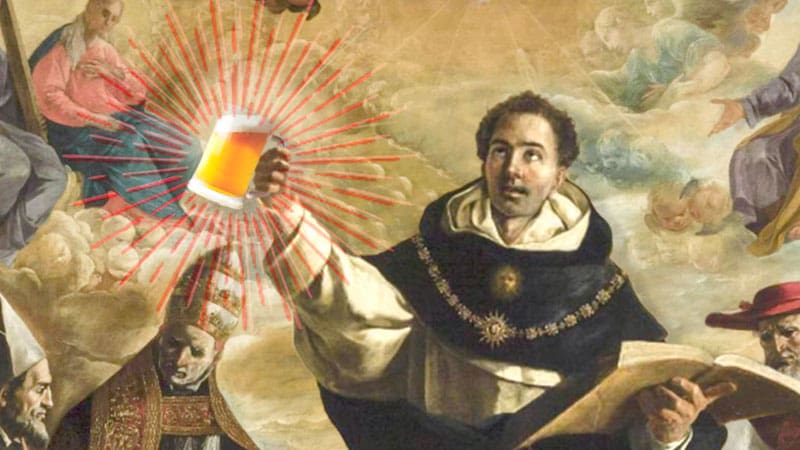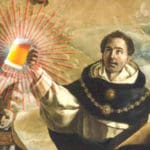Objection 1. It would seem that the use of wine is altogether unlawful. For without wisdom, a man cannot be in the state of salvation: since it is written (Wisdom 7:28): “God loveth none but him that dwelleth with wisdom,” and further on (Wisdom 9:19): “By wisdom they were healed, whosoever have pleased Thee, O Lord, from the beginning.” Now the use of wine is a hindrance to wisdom, for it is written (Ecclesiastes 2:3): “I thought in my heart to withdraw my flesh from wine, that I might turn my mind to wisdom.” Therefore wine-drinking is altogether unlawful.
On the contrary, The Apostle says (1 Timothy 5:23): “Do not still drink water, but use a little wine for thy stomach’s sake, and thy frequent infirmities”; and it is written (Sirach 31:36): “Wine drunken with moderation is the joy of the soul and the heart.”
I answer that, No meat or drink, considered in itself, is unlawful, according to Matthew 15:11, “Not that which goeth into the mouth defileth a man.” Wherefore it is not unlawful to drink wine as such. Yet it may become unlawful accidentally. This is sometimes owing to a circumstance on the part of the drinker, either because he is easily the worse for taking wine, or because he is bound by a vow not to drink wine: sometimes it results from the mode of drinking, because to wit he exceeds the measure in drinking: and sometimes it is on account of others who would be scandalized thereby.
ST II-II, Q. 149, A 3.
—
Drunkenness may be understood in two ways. First, it may signify the defect itself of a man resulting from his drinking much wine, the consequence being that he loses the use of reason. On this sense drunkenness denotes not a sin, but a penal defect resulting from a fault. Secondly, drunkenness may denote the act by which a man incurs this defect. This act may cause drunkenness in two ways. On one way, through the wine being too strong, without the drinker being cognizant of this: and in this way too, drunkenness may occur without sin, especially if it is not through his negligence, and thus we believe that Noah was made drunk as related in Genesis 9. On another way drunkenness may result from inordinate concupiscence and use of wine: in this way it is accounted a sin, and is comprised under gluttony as a species under its genus. For gluttony is divided into “surfeiting [Douay:,’rioting’] and drunkenness,” which are forbidden by the Apostle (Romans 13:13).
ST II-II, Q. 150, A. 1.
—
Objection 1. It would seem that drunkenness does not excuse from sin. For the Philosopher says (Ethic. iii, 5) that “the drunkard deserves double punishment.” Therefore drunkenness aggravates a sin instead of excusing from it.
On the contrary, According to Augustine (Contra Faust. xxii, 43), Lot was to be excused from incest on account of drunkenness.
I answer that, Two things are to be observed in drunkenness, as stated above (Article 1), namely the resulting defect and the preceding act. on the part of the resulting defect whereby the use of reason is fettered, drunkenness may be an excuse for sin, in so far as it causes an act to be involuntary through ignorance. But on the part of the preceding act, a distinction would seem necessary; because, if the drunkenness that results from that act be without sin, the subsequent sin is entirely excused from fault, as perhaps in the case of Lot. If, however, the preceding act was sinful, the person is not altogether excused from the subsequent sin, because the latter is rendered voluntary through the voluntariness of the preceding act, inasmuch as it was through doing something unlawful that he fell into the subsequent sin. Nevertheless, the resulting sin is diminished, even as the character of voluntariness is diminished. Wherefore Augustine says (Contra Faust. xxii, 44) that “Lot’s guilt is to be measured, not by the incest, but by his drunkenness.”
ST II-II, Q. 150, A. 4.
—
PintsWithAquinas.com






Reader Interactions